Please use the following link to download the July 13, 2019 issue of the syəcəb:
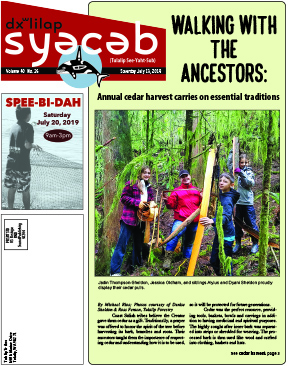
syəcəb
Please use the following link to download the July 13, 2019 issue of the syəcəb:


Scheiyenne Lane was born on June 19, 1993 in Everett, Washington to Galen and Regina (Zackuse) Lane and returned to the creator on July 4, 2019.
Scheiyenne, an enrolled member of Tulalip Tribes, lived all of his life in Tulalip, Attended Tulalip and Marysville Schools, graduated in 2011. At the age of 4 Scheiyenne started playing basketball at the Everett Boys & Girls Club. He also enjoyed playing little league baseball, worked summer youth and had an opportunity to work at the Tulalip Resort Casino in the buffet restaurant in which he enjoyed working with the chefs there. He also worked with Tulalip Housing Maintenance mowing lawns. “Schei”, “Ton Ton”, “Double T” or “Bo Boy” were the nicknames his loved ones called him. His most favorite past times were playing video games, x-box, grand theft auto, call of duty, Halo, Mario, and also loved skateboarding, snowboard-ing, and surf boarding, roller blading, speed skating, listening to all his favorite music, swimming, traveling to Hawaii with his mom, dad, and sisters, Sheniece and Temryss. And travelled to Puerto Rico with brother, Dakotah and sister-in-law, Jessie. He was a proud uncle to his nieces and nephews, Luz, Koda, Solana, and Isis Rose. Above all else Scheiyenne loved and cherished time purse seine fishing with his dad. Also loved growing up and hanging with his cousins, Breland and Shylee. Scheiyenne was a very giving, selfless, loving person. He wore his heart on his sleeve, he was a gentle spirit. He was quick to uplift people even if he was suffering himself. He had a very infectious, contagious laugh! He always wanted to lighten people’s spirits, we will miss him forever!!
Our beloved Scheiyenne is survived by his Father, Galen and Mother, Regina Lane, siblings: Sheniece (Eric) Lane, Dakotah and Jessie Lane, Temryss and (Orion) Lane; nieces and nephews, Luz, Dakotah, and Isis Rose Lane, and Solana Edenshaw,; Grandparents, Gene and Marie Zackuse, Uncle’s, Junior (Jolene) Zackuse, Nathanial (Bugz) Zackuse, Jerard (Tabitha) Zackuse, Great Uncle’s, Harold (Juju) and Darlene Joseph, LeRoy and Judy Joseph, Kenneth Joseph; Great Aunts, Karen and Cy Fryberg, Judy and Tony Gobin, Carmen and John Burke; Great Great Uncle LeRoy and Lila Henry, Great Great Uncle Eugene (Stubby) Henry, Great Great Aunty’s, Annette Napeahi, Virginia Bill and Mary Jo James, Great Great Uncle Pete Henry. All from Tulalip. From the Lummi Tribe, Uncle Sonny and Jeanette Lane, Uncle Pat, Uncle Fred (Ronnie) Lane, Uncle Willie (Aileen) Lane, Uncle Michael (Terika) Lane, Aunty’s, Laverne Lane, Marcelline (David) Lane, Tina and Tony Julius, Doreen Lane, and Vernell Lane. Great Great Aunty Alice Scott, and Godparents, Vernon Jr. and Jeanette Lane. Preceded in death by Grandparents, Vernon and Nancy Lane, Great Grandparents, Harold (SLO-Jo) Joseph and Loretta James, and Pauline Comenote, Aunt Joanne Lane, and Cousin Michael Lee Joseph.
Visitation will be held Monday, July 15, 2019 at 1:00 pm at Schaefer-Shipman Funeral Home with a Rosary service to follow at 6:00 pm at the Tulalip Gym. Funeral services will be held Tuesday at 10:00 am with burial to follow at Mission Beach Cemetery.

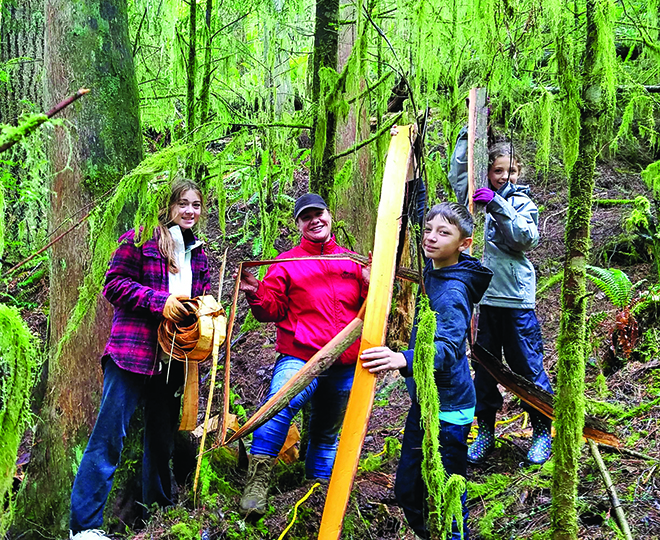
By Micheal Rios; Photos courtesy of Denise Sheldon & Ross Fenton, Tulalip Forestry
Coast Salish tribes believe the Creator gave them cedar as a gift. Traditionally, a prayer was offered to honor the spirit of the tree before harvesting its bark, branches and roots. Their ancestors taught them the importance of respecting cedar and understanding how it is to be used, so it will be protected for future generations.
Cedar was the perfect resource, providing tools, baskets, bowls and carvings in addition to having medicinal and spiritual purposes. The highly sought after inner bark was separated into strips or shredded for weaving. The processed bark is then used like wool and crafted into clothing, baskets and hats.
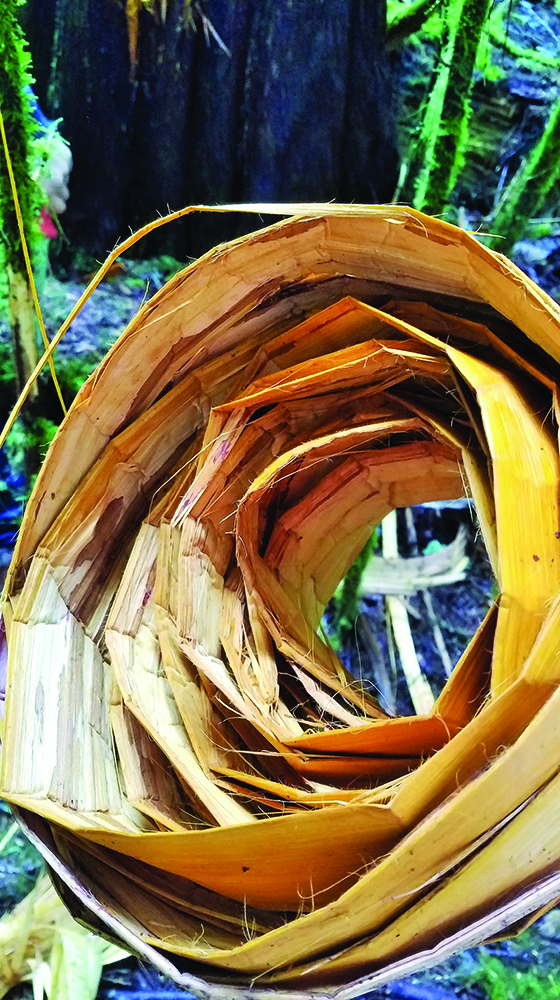
Those same traditional teachings are practiced today and continue to thrive by being passed down from one generation to the next. Over multiple weekends in June, the Tulalip Tribes membership was given the opportunity to participate in the cultural upbringings of their ancestors by journeying into their ancestral woodlands and gathering cedar. “I enjoy cedar harvesting and get excited as the time to pull gets closer,” shared Tulalip tribal member Denise Sheldon. “I find myself checking out the cedars wherever I go, thinking hmm it must be season. I love taking my grandkids out to teach them how to pull and separate the outer bark. It’s an important tradition for our family.”
Led by Forestry staff from Tulalip’s Natural Resources Department, participating tribal members like Denise and her family ventured just north of Sultan to a cedar-filled bounty located on the outskirts of the Mount Baker-Snoqualmie National Forest.
The yearly cedar harvest showcases a partnership between several agencies working as a team to coordinate this culturally significant opportunity. The Tulalip Natural Resource’s Timber, Fish, and Wildlife Program generally arranges a cedar harvesting site for the upcoming season by utilizing existing relationships with off-reservation landowners and the Washington State Department of Natural Resources (DNR).
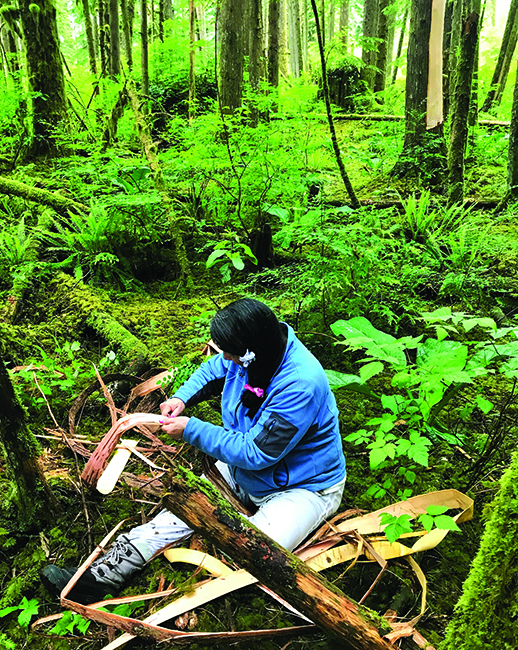
“The annual cedar pulling event is a collaborative effort between multiple parties and agencies, both internally within Tulalip Natural Resources and the WA State DNR,” explained Ross Fenton of Tulalip Tribes Forestry Program. “Typically we try to arrange a bark pulling site up to a year in advance, to ensure a continued opportunity for the Tulalip membership. Our Timber, Fish and Wildlife program staff has been integral to maintaining a partnership with DNR over the years to allow for continuing gathering opportunities. There are many logistics involved, and the results of our work is tangible.
“I’ve been attending the annual cedar harvest for nearly ten seasons now. For me personally, it is an honor to witness an event that has been ongoing for millennia. I really enjoy watching younger generations grow and then teach the skills to their own children as they grow. There are many generations participating, and that’s really neat to observe,” added Fenton.
The relationship Coast Salish peoples have with cedar cannot be understated. Their ancestors relied on the magnificent tree as an integral part of life on the Northwest Coast. From birth to death, the powerful cedar provided generously for the needs of the people – materially, ceremonially and medicinally. Those teachings have not been lost.
“We pray before we start harvesting, so it is done in a good way, and ask for protection from animals or spirits that might harm us,” reflected Denise of her days spent walking in the shadows of her ancestors. “I haven’t been pulling as long as my mom, Keeta, or sisters, Marilyn and Jamie. It has taken me some time to get the hang of it, but I really love being out in the woods with my family. I tell my grandkids they need to learn as much as they can because they will be pulling for me when I get too old to do it anymore. One day they will be the elder teaching their kids and grandkids.”
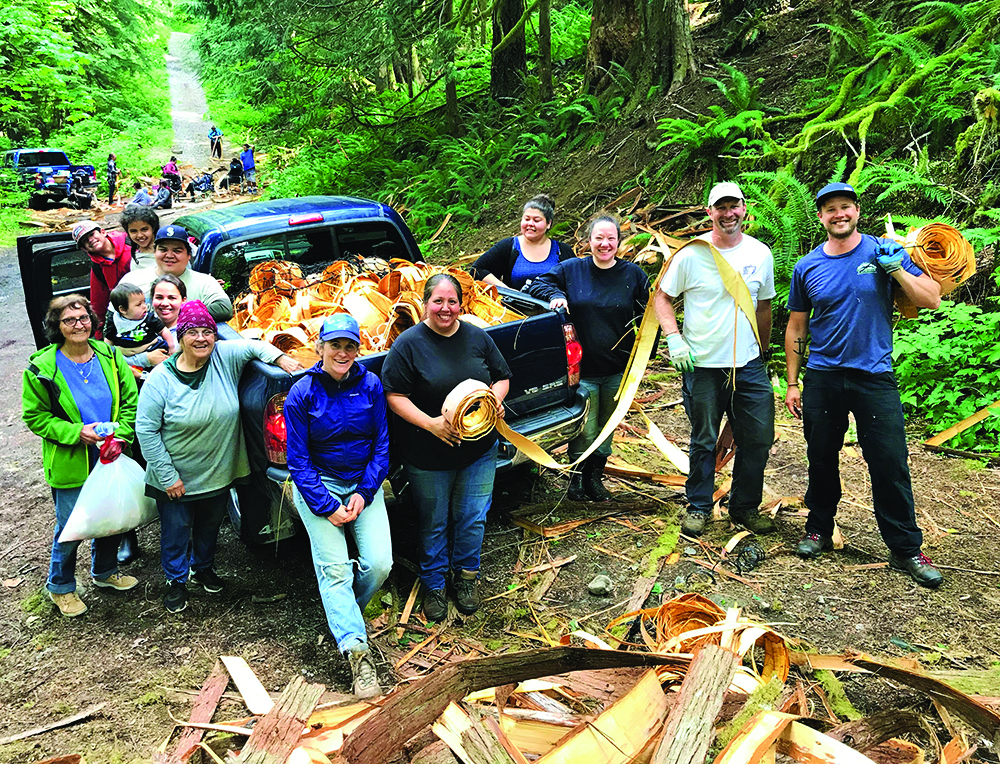
Master weavers, elders, and youth alike all echo the very same cedar harvesting technique employed by their ancestors. With a small ax and carving knife, they skillfully remove strips of bark from designated cedar trees. They then shave off a small section of the rough bark, revealing a smooth tan inner layer. After harvest, the cedar strips are typically laid out to dry for a year before being made into baskets and hats or used in regalia.
Many Tulalip youth participated in the multi-day cedar harvesting occasion, gathering strips for elders and learning techniques of separating the smooth inner bark from the rough outer bark. For some tribal members it was another step in their continual journey to connect with the spirits of past and present, while for others it was their very first cedar harvest experience.
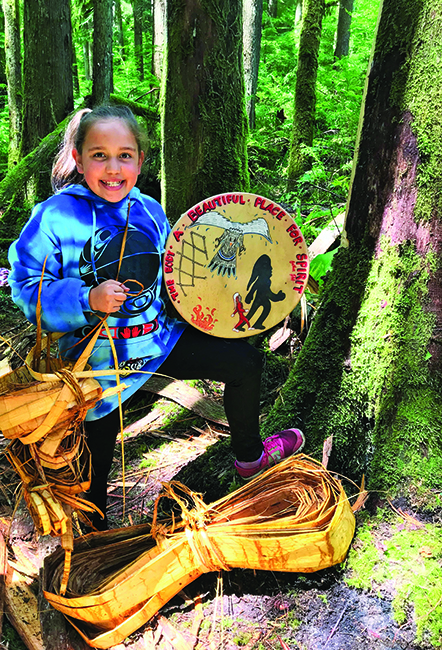
“The cedar was kind of hard to separate at first, but the more I pulled the better I got,” beamed first time cedar harvester, 10-year-old Sophia Quimby. “It was a lot of fun pulling the cedar and seeing how far we could get it to go. Me and my mom are going to make roses and baskets from our cedar.”
Safe to say the essential teachings from cedar gathering have successfully been passed on to yet another generation of Tulalip culture bearers. The ancestors would be pleased.
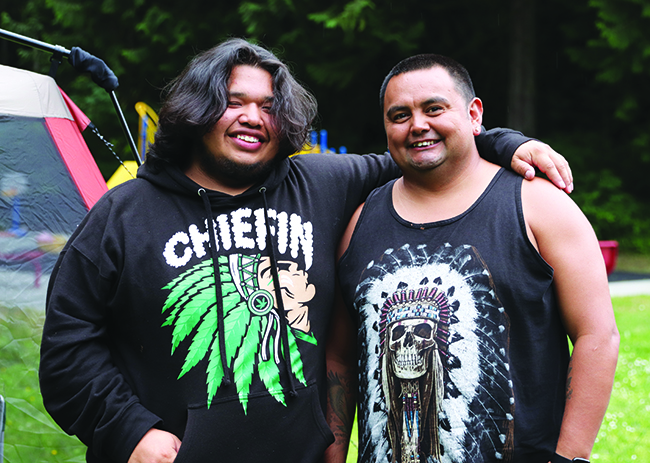
By Kalvin Valdillez, Tulalip News
On the evening of June 26, a small gathering occurred behind the Tulalip beda?chelh building. Laughter filled the air as people visited with one another in celebration of achievement in honor of the Family Haven program, Young Men’s Team Outreach. In the middle of the mix was Outreach Worker, Cody Monger, fondly reminiscing with his young clients about their successes over the past few years.
“We’re celebrating the end of our mental health grant from the North Sound BHO (Behavioral Health Organization),” said Cody. “It was a good three-and-a-half-year experience. It was a great grant that opened up a lot of doors for me to explore, to be a part of and help out our community.”
The outreach program was designed to provide support to Tulalip youth, helping teens who are facing hard times accomplish their goals and get life back on track. Through Cody’s guidance, the young men learned how to set, prioritize and accomplish both short and long term goals and were also provided assistance with recovery, physical and mental health, legal issues, obtaining a driver’s license, money management and resumes. The program also assists adolescents by promoting academics, helping dropout students re-enroll into school in order to obtain their high school diploma or GED, as well as providing a space to study every Wednesday.
Cody meets one-on-one with each of the young men on a weekly-basis, allowing them the chance to vocalize any current difficulties they are experiencing as well as celebrate any new victories. He also meets with his clients where they are most comfortable, whether it’s at the Family Haven office, home, school, a coffee shop or a restaurant. And due to the success of the young men’s outreach program, Family Haven recently established a Team Outreach for the young ladies of the community.
“Before the program, I noticed there was a lot of kids who were not being helped,” expressed Cody. “I wanted to try to make a difference in the community by helping them out in any way that I could. Now I work with the young guys, the ones who are suicidal, not connected with school or in need of services. I meet with them individually three to four times a week and also take after hour calls or texts.”
Perhaps it’s because of his young age, his sound advice or his intentions, whatever it may be, Cody has received a great response from the young Tulalip men who confide in him on a regular basis. Thanks to the funding from the North Sound BHO, the program assisted upwards of forty young men during the grant’s three-year period. This year alone, Cody managed a large caseload of about twelve clients while also keeping in contact with approximately ten more young adults, routinely checking in to make sure they are doing okay.
One client, Darrian Solomon, expressed his gratitude for the program during the event stating, “This program and Cody helped me out a lot. He’s been a reliable friend; somebody I can always talk to. He’s really helped me get through a lot.”
As one door closes, another one opens as recently the Tulalip Tribes announced they would take over the funding for the Young Men’s Team Outreach program. The transition from a grant to hard dollars allows Cody to work with larger caseloads and broader age groups as well as plan more activities and events, one idea being a weekly father’s group meet up.
“We’re really thankful that the Tribe picked this program up because otherwise it would go away,” stated Alison Bowen, Family Haven Program Manager. “Some of the things and the growth that these young guys have gone through has been really amazing to witness. Ranging from getting back into school, getting jobs, getting connected with the community and culture, it was a group of individuals who weren’t really involved with anything before and it’s exciting that this is going to continue for them.”
“It’s important for our kids to know that there is somebody out there willing to go above and beyond for them, to help them through their darkest times,” said Cody. “I know sometimes it’s hard to reach out to ask for that peer support, or help in general. It’s a good feeling for them, knowing that there are people who are genuinely looking out for what’s best for them and their future.”
For more information, please contact Tulalip Family Haven at (360) 716-4402.
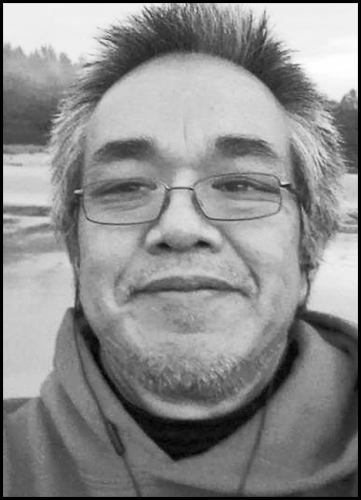

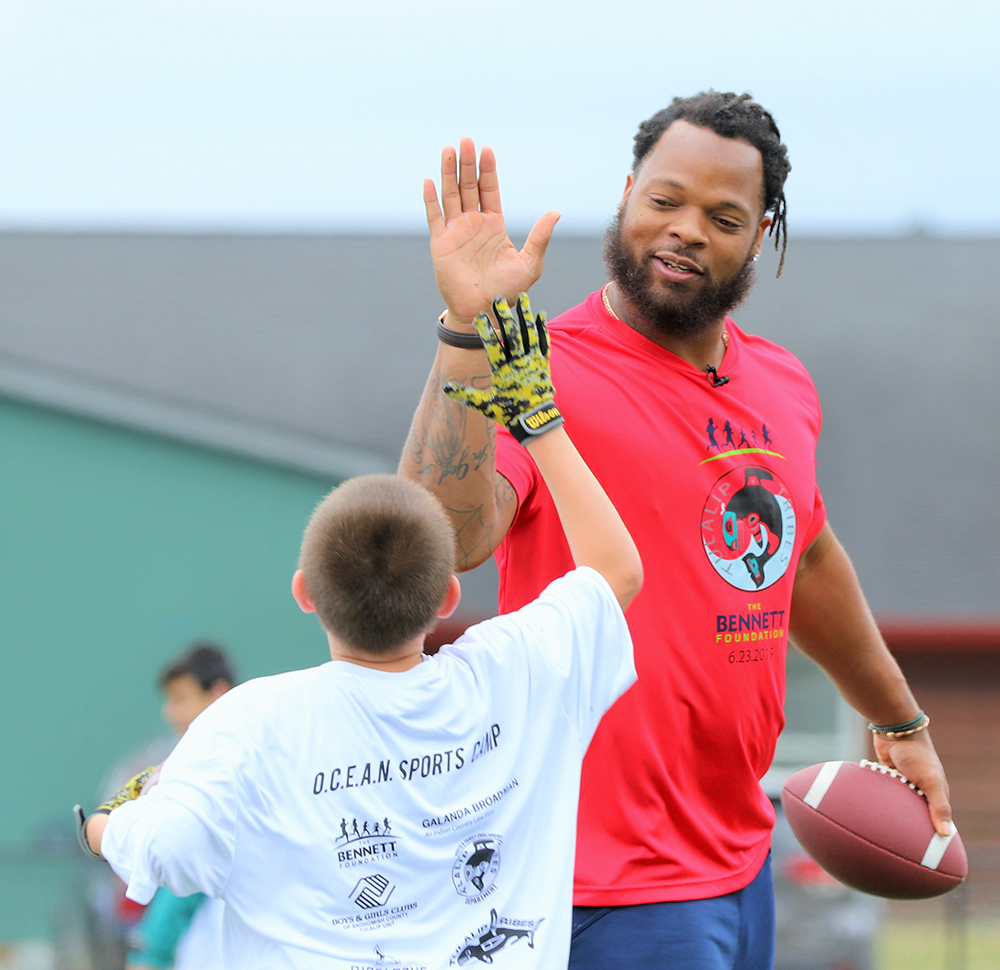
By Micheal Rios, Tulalip News
The Pacific Northwest is Seahawks country. From Blue Fridays to rallying chants of “Sea-Hawks!”, the 12th Man is synonymous with Seahawks fandom. But even for the most devout of fan bases, it’s a rarity for beloved players to make themselves accessible to their adoring fans, let alone those who live on a small reservation an hour outside of Seattle. Amazingly, Super Bowl champion Michael Bennett proved to be the rare exception when he held an inclusive football camp on the Tulalip Reservation.
“It’s important to give tribal people, the original people of Seattle, the opportunity to be with the players they follow and love to watch on Sundays,” said Bennett. “Even though their circumstances are different, I want to help empower them to fight for what they want to fight for while always being the people they want to be.”
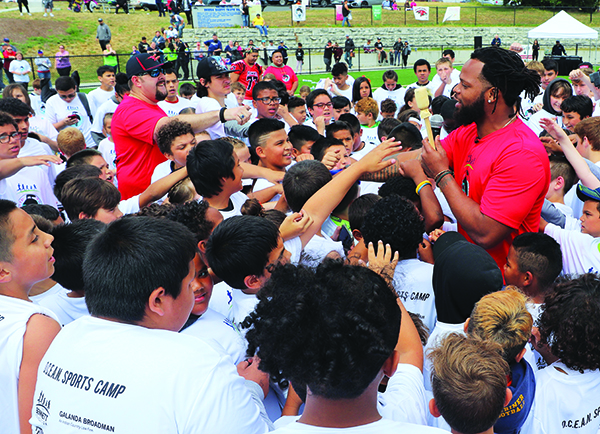
Nearly 250 kids between ages 7-18 years old participated in the highly anticipated O.C.E.A.N. sports camp held at the Tulalip Sports Complex on Sunday, June 23. Registration was completely free of charge for any youth of Tulalip and surrounding communities thanks to collaborating partners Rise Above, Boys & Girls Club of Snohomish County, Tulalip Tribes, Galanda Broadman and The Bennett Foundation.
“We’ve been using football camps as a way to promote healthy lifestyle choices and overall wellness for close to seven years now,” explained Bennett Foundation cofounder Pele Bennett, Michael’s wife. “The Foundation has been fortunate to host camps in other states and countries. Even though Michael is no longer a Seahawk, we love being able to return to Seattle where we are so welcomed and make an impact to the local communities.”
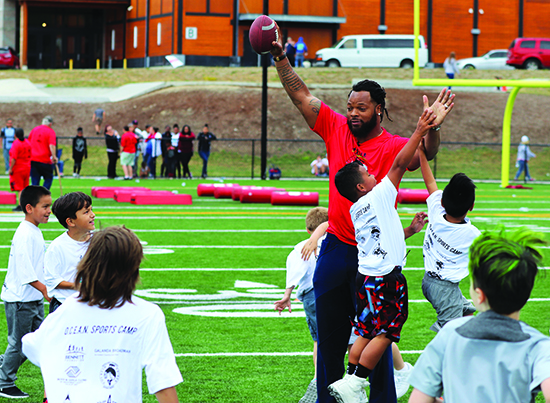
During his five-year tenure as a Seahawk, Bennett was a defensive stalwart with an uncanny ability to get after the opposing team’s quarterback. Even casual fans remember his celebratory sack dance that happened so frequently it earned him three consecutive trips to the Pro Bowl and his team back-to-back Super Bowl appearances. Now, he’s using his abilities and larger-than-life personality to tackle a new opponent, childhood obesity.
“When you look at obesity and diabetes in our community, the black and brown communities around the world, it’s rampant,” said Bennett. “Food and nutrition are the biggest barriers to the overall well-being of our peoples. People don’t have Whole Foods everywhere they go. For tribal people, they don’t have access to their traditional foods. It’s important to have a sense of compassion and empathy for what other people are going through, and work together to break down those barriers that divide us.”
Bennett and his wife Pele started The Bennett Foundation with the goal of raising awareness about obesity and providing communities with educational opportunities to learn how to live a healthy and active lifestyle. As one of the longest running programs of The Bennett Foundation, O.C.E.A.N. is an acronym for fighting Obesity through Community, Education, Activity and Nutrition. The objective of the O.C.E.A.N. sports camp is to educate the community on healthy food choices and promote physical fitness as a family.
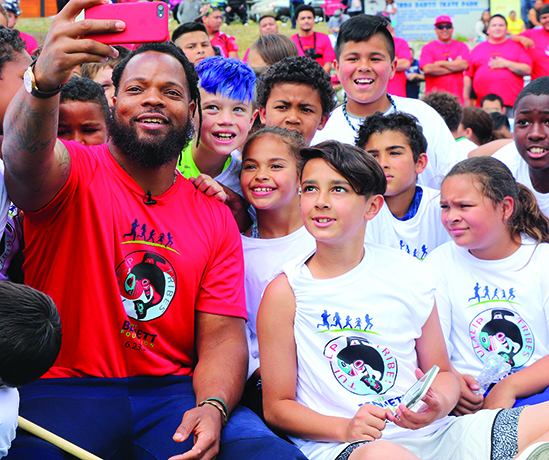
Every camp is designed specifically for each individual community, and may feature a health expo, a family fitness clinic, or an exciting fitness challenge. For Tulalip, the emphasis was on physical fitness through a variety of football drills and skill building exercises that were enjoyed by all youth participants.
Among the hundreds of eager kids who made it out on the picture-perfect summer day in Tulalip were families journeying from as far south as Olympia and as north as Nooksack. Of course, many local parents and guardians took full advantage of the on-reservation event to have their young athletes meet a sports superhero they’ve only seen on TV playing for their favorite football team.

Excited 8-year-old Annavay Hatch and 7-year-old Lila Joel described meeting the former Seahawks Pro Bowler as “Good. Wait, no, it was great!” Both ran multiple passing routes in the hopes of catching a football thrown by Bennett. Annavay beamed a huge smile after catching a Bennett pass, while Lila was unable to, but still had lots of fun trying. “I caught zero. The ball was slippery, but I came really close a couple times,” she said.
Making a memory she’s sure to never forget, 11-year-old Noelani Cultee ran a Doug Baldwin-like comeback route, jumped up, extended her arms as far as she could and made a highlight catch by bringing in a Bennett pass thrown well above her head. Following the impressive play she boasted, “That was so cool. I thought I wasn’t going to catch it because I could feel it slipping through my fingertips, but I held onto it!”

Countless youngsters made the most of their opportunity to catch a pass from the Super Bowl champ. One after another managed to reel in a pass and after each successful attempt they’d quickly run the ball back to Bennett and give the professional football player an ecstatic high-five. At one point Bennett joked he’d connected on so many touchdown throws that the Seahawks should sign him as their backup quarterback.
As the kids motioned around the football field transitioning from station to station they completed a number of physical activities. Aside from the countless curl, post, slant, and out routes ran, they also engaged in agility ladders, tested their lateral reactions with cone drills, jumped mini hurdles, and got stronger with lunges, squats and pushups just like the pros. With a DJ providing musical hits to workout to, there were only positive and encouraging vibes in the air.
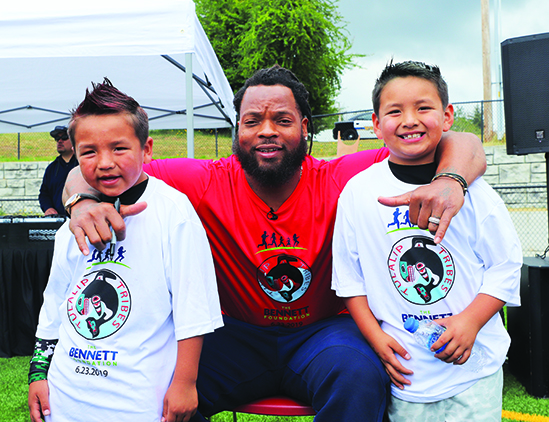
“You can just feel the positive energy that’s here in this moment,” marveled Jaci McCormack (Nez Perce), founder of the nonprofit Rise Above which uses sports to educate and empower native youth to live healthy lives. “There’s no way to measure how these camps and athletic clinics impact these kids long term, but if we could measure that I think it would be a significant.
“These kids are going to remember catching a pass from Michael Bennett for the rest of their lives,” continued Jaci. “It’s not necessarily about football, it’s about Michael and all the volunteer coaches choosing to be here and spend time with them. We care about them, they are our future and for them to choose to make positive choices every day is the ultimate goal. Experiences like this speaks volumes to our kids and lets each of them know they matter.”
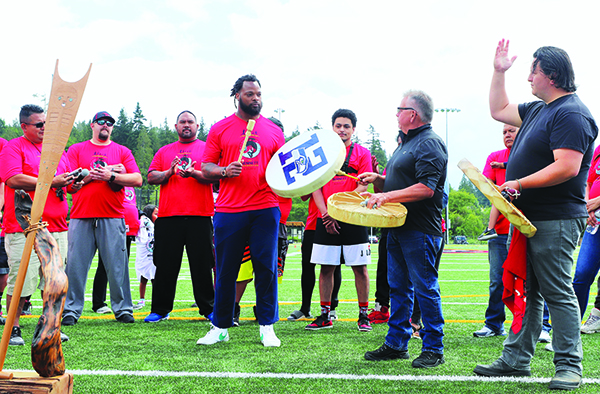
Following the football-filled afternoon, everyone gathered in the end zone to conclude the event with a traditional song. Bennet was gifted a unique ‘Salish Song’ paddle and commemorative 12th Man hand drum. Generously giving of his time, the NFL defensive end stuck around for an additional hour and a half to ensure every camp participant and adoring fan, including many parents and volunteer coaches, received an autograph and one-on-one picture.
“When you interact with tribal people, you feel the spirit of everything around, the essence of where you are,” reflected Bennett as he walked off the field and took in the scenery that is Tulalip Bay. “Here there’s a culture behind everything, there’s a significance to everything being done. It’s powerful, something I’ll never forget.”
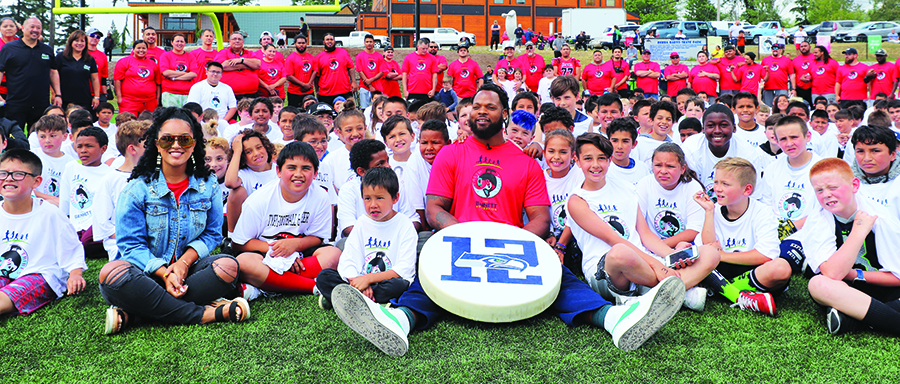

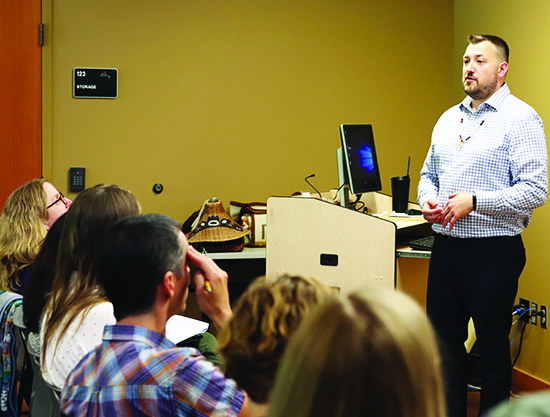
By Kalvin Valdillez, Tulalip News
“Change can either mean good or bad,” expressed a local environmentalist to an audience of about sixty. “I know it’s only semantics, but I think we should start addressing it as it is, a climate crisis.”
A disruption of the food chain is currently occurring in the Pacific Northwest as sea level rise, pollution and ocean acidification are causing an alarming decrease in the salmon and orca populations. Climate change is not only affecting the Salish waters, but also threatening tribal ancestral lands as wildfires have unfortunately become a statewide yearly occurrence, and the recent increase of outdoor recreationalist are interfering with tribal spiritual and hunting practices.
A recent report by Seattle Times states that due to the warm weather this past May, the statewide snowpack percentage is only at 58% of the normal average, while Snohomish County’s snowpack had the lowest percentage, measuring at 29%. As the snowpack melts, it delivers water into local streams, rivers, lakes, estuaries and bays. As a result of this year’s dry climate, the state is gearing up for a summertime drought and preparing for a series of wildfires.
Climate change is inevitable and scientists are now reporting the world will feel the extreme effects of global warming sooner than anticipated. Several tribes are at the forefront, fighting to save Mother Earth and slow down the process of climate change by raising awareness, protesting big oil and energy companies, and dedicating their efforts to recover the once abundant salmon population. More often than not, the tribes are joined by a handful of environmental agencies who are fighting alongside for the same cause.
This past January, the Tulalip Tribes Natural Resources department organized a daylong presentation for local outdoor recreational groups in an effort to establish a positive working relationship and also equip the groups with a basic knowledge of treaty rights. The event was such a success, they decided to host another workshop, on June 20 at the Hibulb Cultural Center (HCC), tailored to surrounding environmental organizations.
“We have so many goals in common, so many projects that we should be working on together,” said Tulalip Natural Resources Environmental Liaison, Ryan Miller. “And one of the best ways to do that is to make people feel included, and I think people should be included, because it’s their treaty as much as it is ours. We’re not just talking about treaty rights for tribal members, we all had representation at the treaty signing. If you’re a citizen of the United States, you were represented by the territorial governor, Isaac Stevens, and as Indian people we also had our representation there. I want people to understand that we all have ownership over the treaty and we have a duty to uphold it, whether you’re a non-Indian person or a tribal member.”
Over sixty participants, from nearly forty organizations, attended the sold out presentation. Beginning their day in the HCC longhouse, the group was welcomed by Tulalip Chairwoman Teri Gobin, who offered a welcoming song. The group then proceeded to a classroom at the museum where they spent the day learning about the Point Elliot Treaty of 1855 and the significant value it holds for both tribal and non-tribal Washington State residents.
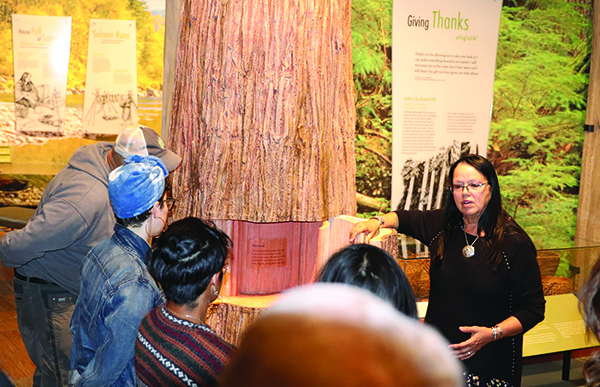
To get a basic understanding of generational trauma, Tulalip Elder and Natural Resources Special Projects Manager, Patti Gobin, began the presentation by sharing a personal family story about her grandma, Celum Young, who was a first generation Tulalip boarding school student. Patti explained that because of years of forced assimilation, Celum struggled with her identity after enduring years of physical abuse for speaking her language and practicing her traditions while at the boarding school. As a direct result from the boarding schools, Patti admitted that her grandmother avoided teaching her children and grandchildren certain traditions in fear that they would be punished just as she was. Over time, Celum and other boarding school students inadvertently passed their boarding school traumas onto the next generation and many Native families still struggle with generational trauma to this day.
Today, Patti and her family are very involved in the Tulalip culture, taking part and leading in a number of ceremonies and traditions, including stripping cedar every summer.
“Stripping cedar is a very critical part of our culture for weaving and many other purposes,” Patti said. “As we were stripping cedar one day, we sang our songs to thank the cedar trees for letting us have portions of its life to become a part of our lives. As we’re doing this, all we could hear was, zoom. Motor bikes were going by throughout the whole day we were there. One young man stopped and asked, ‘what are you doing here, are you cutting all these trees down?’ I said no we are stripping cedar, it a traditional way of our life. He said, ‘oh’, strapped on his helmet and zoom, he took off.”
Patti shared this particular story to explain how the Tribe’s treaty rights are often violated in today’s society. The 1855 Treaty of Point Elliot is a formal agreement between the federal government and the people who make up the central and north Puget Sound tribes, including the Snohomish, Snoqualmie, Skykomish and other allied bands. As direct descendants of the Snohomish, the Tulalips ceded millions of acres of land, agreeing to move their people to the present day Tulalip reservation. In return, the Tribe retained their rights to fish in their usual and accustomed grounds as well as hunt and gather on open and unclaimed lands in order to continue practicing their traditional cultural lifeways.
Because of the change in the environment since the industrial revolution, the Tribe is diligently working to preserve the natural world as much as possible by spearheading a number of projects like the Qwuloolt Estuary project as well as the Mount Baker-Snoqualmie Forest huckleberry restoration. The Tribe is also making strong efforts to continue teaching the next generations how to care for the land and the waterways at the annual Fish and Mountain Camps, so that the resources remain available for decades to come.
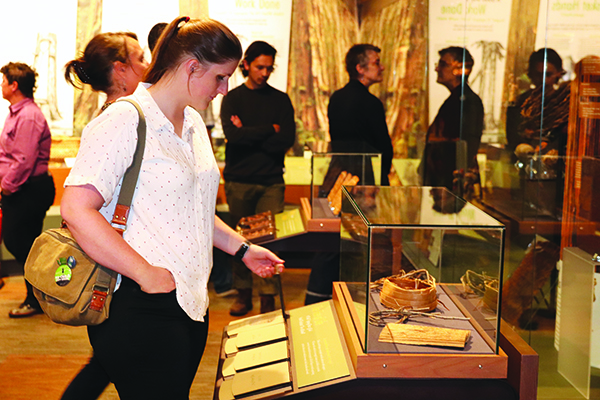
“If we’re able to exercise treaty rights in a forest, that means it’s a healthy forest,” explained Ryan. “If we’re able to fish in the salt water, then we know that we have at least some good health there. What we’re really looking at is, are we protecting these places enough that they support treaty rights, and if we are, then we’re headed in the right direction. It’s when we get to these places where tribes don’t have access to the resources, like they had before, then we know somethings wrong because we’ve been accessing those resources for thousands of years.”
Ryan went into depth, explaining the Treaty of Point Elliot to the environmentalists while also briefly touching on the Boldt Decision. During his presentation he reaffirmed that the treaties are the supreme law of the land according to the US Constitution, and that the federal government has an obligation to uphold and support the ideals agreed upon between the state and tribal people. A major eye-opener for the participants was that the treaty not only applies to them, but they also have a role and a duty to support the treaties of the Coast Salish tribes as well. They learned how the treaty can help protect the environment and how a number of projects that would negatively affect our quality of life were ultimately shut down because they were in violation of tribal treaty rights.
Natural Resources Senior Environmental Policy Analyst, Libby Nelson, also demonstrated an informational presentation, giving the group a look at how the increasing population of the state is attributing to climate change as well as affecting tribal hunting and gathering rights.
“A lot of these organizations are going to support tribes, they just don’t necessarily know about treaty rights, they don’t know about tribal lifeways,” Libby stated. “At a time where there’s so much growth in this area, we need allies. We got a climate that is changing and there’s a lot happening to the environment right now, we need to be on the same page. We think there’s a lot more room for coming together through learning about who the tribes are and what treaty rights are all about. And understanding that, not only is it the right thing to do, but also treaty rights are a powerful tool for ensuring that we don’t diminish further resources that are out there for everybody.”
After a Q&A session, the Natural Resources department handed out a list of principles and asked the environmental organizations to consider adopting and incorporating them, as well as modifying them to meet their own personal mission and values. A local non-profit, Forterra, gave a little insight to the group on how their organization adopted the list of principles and have developed a strong relationship with the Tribe. Ryan also stated that one of the recreational groups from the first treaty rights event has also adopted the principles, while several others groups are working with their board members to commit to the principles as well.
“I’m really hopeful that this is going to continue and expand, not only for us but for other tribes, and that it will have a real tangible impact on the relationships between our sovereign nations and governments, and also between our nations and all the non-governmental organizations that we partner with,” Ryan said. “One of the things we always want to be careful of and cognizant of is that this is Tulalip’s view, we only represent Tulalip, we do not represent other tribes. What we are trying to do is help create educational opportunities for these organizations and governments. We’re really hopeful that other tribes will pick up on this as well and that they’re going to push forward to do the same thing with the groups that work in their areas.”
“There was a lot of amazing information, especially for non-natives who are interested in supporting sovereign nations here in the state,” expressed Jacob DeGuzman of the Seattle Parks and Recreation department. “It reinforced knowledge I did know, like treaties are the supreme law of the land, but also highlighted aspects that I didn’t know, one of those being that the treaties benefit all of us. Ryan stated that as a Washington resident or a citizen of the United States, we are legally obligated to uphold those treaties and advocate for them. It helped us gain a much more expanded perspective of the land and the people that are still here caring for it.”
The Tulalip Natural Resources department is planning one more Understanding Treaty Rights event during the fall which will be specific to governmental entities of the Pacific Northwest. For more information, please contact Natural Resources at (360) 716-4480.